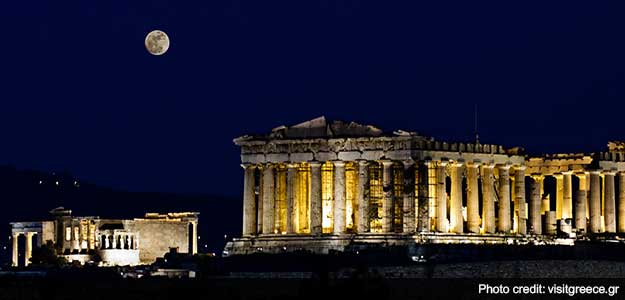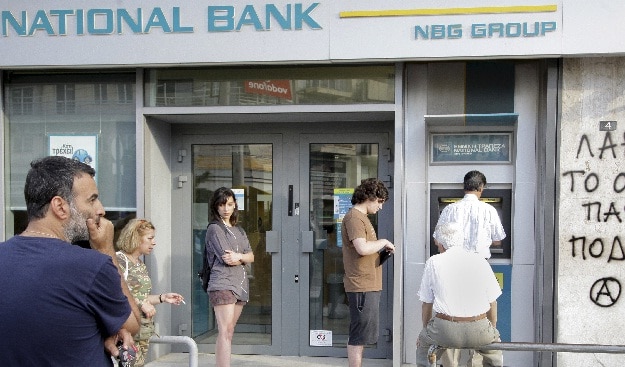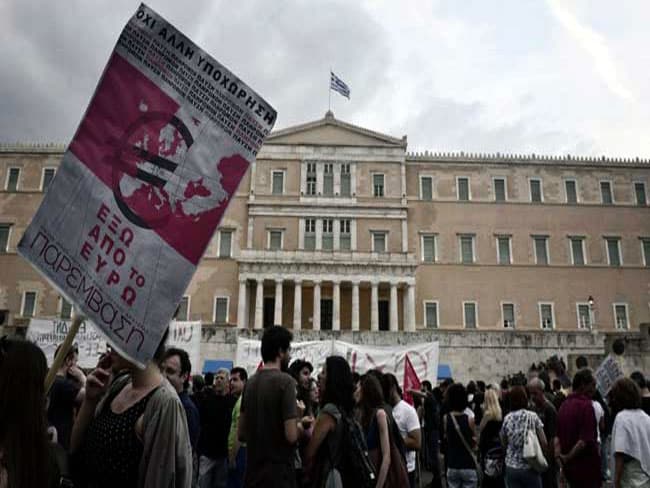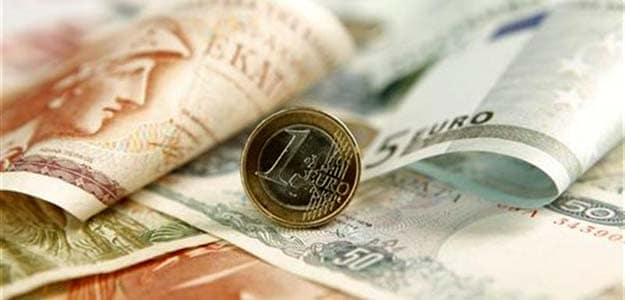As French Finance Minister in 2010, Christine Lagarde opposed the
involvement of the International Monetary Fund (IMF) in Greece.
Now as the country stands on the edge of defaulting on a 1.6 billion euro ($1.8 billion) payment to the International Monetary Fund, Ms Lagarde's tenure at the head of the fund since 2011 will be shaped by Greece, which holds a referendum on Sunday that could pave the way to its exit from the euro.
By its own admission the Washington-based institution broke many of its rules in lending to Greece. It ended up endorsing austerity measures proposed by the European Commission and European Central Bank (ECB), its partners in the troika of Greece's lenders, instead of leading talks as it had done with other countries such as Russia and in the Asian financial crisis.
"I think the IMF has missed the opportunity (on Greece), because it has not fully leveraged the lessons it learned from the previous crises it was involved in, due to this asymmetric relationship within the troika," said Domenico Lombardi, a former IMF board member.
That the IMF lent to Greece at the behest of Europe, which has nominated every IMF Managing Director since the inception of the fund in 1946, may expose the institution to greater scrutiny, especially as it has $24 billion in loans outstanding to Greece in its largest-ever program.
"When it was clear that the Greek program was underperforming, they did not push back sufficiently against the Eurozone, which had at the time a misguided policy emphasis on only austerity," said Jacob Funk Kirkegaard, a fellow at the Peterson Institute in Washington.
The involvement of the fund in Greece and its continued support for decisions driven by Eurozone governments caused a deep split in the institution.
Some IMF economists had misgivings about lending to Greece in 2010 within the constraints of the so-called "troika" of lenders, where the Fund would be the junior partner to the European Central Bank and the European Commission.
IMF board members also protested the "exceptional" size of the program, as Athens did not meet the fund's criteria for debt sustainability, meaning it would have trouble repaying.
Yet swayed by the fear that contagion in Athens could spread to French and German banks, the IMF agreed to participate in a joint 110-billion-euro bailout of Greece with the Europeans.
"The Europeans have a third of the voting rights (at the IMF), and they have appointed the managing director since the beginning, so essentially it is the governance that has driven the Greek program," said Mr Lombardi who is now with the Canada-based Center for International Governance Innovation.
Later, the fund admitted that its projections for the Greek economy had been overly optimistic. Instead of growing after a year of austerity, Greece's economy plunged into one of the worst recessions to ever hit a country in peacetime, with output falling 22 per cent from 2008 to 2012.
While the Eurozone's insistence on drawing a direct link between euro membership and Greece's debt sustainability and the negotiating tactics of the Greek government have exposed both to questions of credibility, the Fund stands charged as well.
"The IMF's reputation, too, has been shaken from widespread criticism of the Greek programme, including its own admission of its failures," Lombard Street Research economist Konstantinos Venetis said.
Temptation to go big
If Greece does default on all $24 billion it owes to the Fund, that will dwarf previous delinquencies from countries like Sudan, Zimbabwe and Somalia.
While the IMF was worried about contagion when it made the loans, it also had institutional incentives for wanting to bail out troubled countries, said Andrea Montanino, a former IMF board member who left the fund in 2014 after participating in reviews of Greece's second bailout in 2012.
"The IMF is in a preferred creditor status; the more you lend, the more you earn," said Mr Montanino, now with the Atlantic Council.
The IMF's heavy involvement in large bailouts for euro zone countries, which included Ireland and Portugal, have enabled it to build up its reserve buffers in recent years. It is now aiming to store away some $28 billion by 2018.
From interest and charges on the Greek program alone, the IMF has earned some $3.9 billion since 2010, according to figures on the IMF's website.
"I think the Greek lesson is in the future, the IMF will be much more careful," said Mr Montanino.
Now as the country stands on the edge of defaulting on a 1.6 billion euro ($1.8 billion) payment to the International Monetary Fund, Ms Lagarde's tenure at the head of the fund since 2011 will be shaped by Greece, which holds a referendum on Sunday that could pave the way to its exit from the euro.
By its own admission the Washington-based institution broke many of its rules in lending to Greece. It ended up endorsing austerity measures proposed by the European Commission and European Central Bank (ECB), its partners in the troika of Greece's lenders, instead of leading talks as it had done with other countries such as Russia and in the Asian financial crisis.
"I think the IMF has missed the opportunity (on Greece), because it has not fully leveraged the lessons it learned from the previous crises it was involved in, due to this asymmetric relationship within the troika," said Domenico Lombardi, a former IMF board member.
That the IMF lent to Greece at the behest of Europe, which has nominated every IMF Managing Director since the inception of the fund in 1946, may expose the institution to greater scrutiny, especially as it has $24 billion in loans outstanding to Greece in its largest-ever program.
"When it was clear that the Greek program was underperforming, they did not push back sufficiently against the Eurozone, which had at the time a misguided policy emphasis on only austerity," said Jacob Funk Kirkegaard, a fellow at the Peterson Institute in Washington.
The involvement of the fund in Greece and its continued support for decisions driven by Eurozone governments caused a deep split in the institution.
Some IMF economists had misgivings about lending to Greece in 2010 within the constraints of the so-called "troika" of lenders, where the Fund would be the junior partner to the European Central Bank and the European Commission.
IMF board members also protested the "exceptional" size of the program, as Athens did not meet the fund's criteria for debt sustainability, meaning it would have trouble repaying.
Yet swayed by the fear that contagion in Athens could spread to French and German banks, the IMF agreed to participate in a joint 110-billion-euro bailout of Greece with the Europeans.
"The Europeans have a third of the voting rights (at the IMF), and they have appointed the managing director since the beginning, so essentially it is the governance that has driven the Greek program," said Mr Lombardi who is now with the Canada-based Center for International Governance Innovation.
Later, the fund admitted that its projections for the Greek economy had been overly optimistic. Instead of growing after a year of austerity, Greece's economy plunged into one of the worst recessions to ever hit a country in peacetime, with output falling 22 per cent from 2008 to 2012.
While the Eurozone's insistence on drawing a direct link between euro membership and Greece's debt sustainability and the negotiating tactics of the Greek government have exposed both to questions of credibility, the Fund stands charged as well.
"The IMF's reputation, too, has been shaken from widespread criticism of the Greek programme, including its own admission of its failures," Lombard Street Research economist Konstantinos Venetis said.
Temptation to go big
If Greece does default on all $24 billion it owes to the Fund, that will dwarf previous delinquencies from countries like Sudan, Zimbabwe and Somalia.
While the IMF was worried about contagion when it made the loans, it also had institutional incentives for wanting to bail out troubled countries, said Andrea Montanino, a former IMF board member who left the fund in 2014 after participating in reviews of Greece's second bailout in 2012.
"The IMF is in a preferred creditor status; the more you lend, the more you earn," said Mr Montanino, now with the Atlantic Council.
The IMF's heavy involvement in large bailouts for euro zone countries, which included Ireland and Portugal, have enabled it to build up its reserve buffers in recent years. It is now aiming to store away some $28 billion by 2018.
From interest and charges on the Greek program alone, the IMF has earned some $3.9 billion since 2010, according to figures on the IMF's website.
"I think the Greek lesson is in the future, the IMF will be much more careful," said Mr Montanino.











